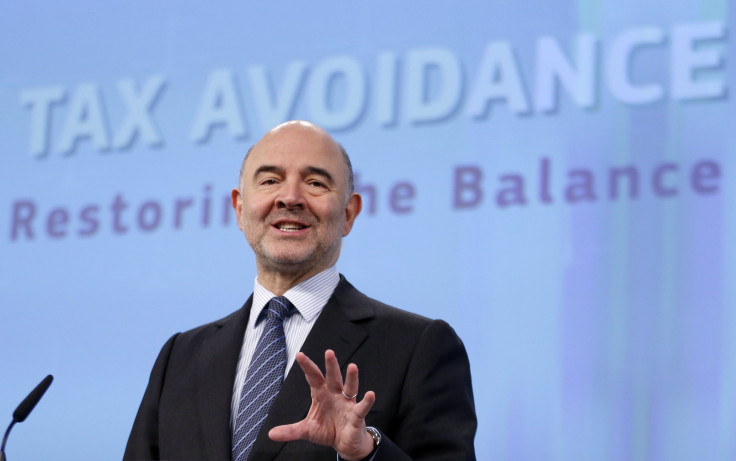US, EU Tax Conflict Looming Over Loopholes For Google, Starbucks, Apple

In Europe, antitrust authorities are ready to investigate American multinationals over the money they pay European governments, and lawmakers are ready to legislate new rules for them. In the United States, members of the U.S. Congress want the Treasury Department to retaliate with higher taxes on European companies.
That sounds like a new U.S.-European war over taxation.
On Thursday, the European Commission announced plans for new legislation that would sew up loopholes in European law that allow companies such as Apple to minimize their tax burdens by squirreling money away in tax havens. And, a previous settlement between British tax authorities and Google came under political pressure for being not stringent enough.
The rhetoric got hotter on both sides of the Atlantic this week.
Pierre Moscovici, the European Union’s commissioner for taxation, called lower taxes paid by multinationals “money that is taken from our hospitals, schools, transport, security and other vital public services."
Recent research by the European Parliament concluded that tax avoidance cost European governments 50 billion to 70 billion euros per year, the equivalent to the annual GDP of Bulgaria, Moscovici said.
American Innovation Matters — a coalition of companies including Facebook, Intel, Cisco and Boeing — called the new European initiative “the latest example of the aggressive moves being made abroad in an effort to tax even more American earnings, and use them to pad the coffers of foreign governments.”
The exchange highlights the charged political environment in which American and European governments are now making tax policy.
Strapped for cash after the 2008 financial crisis and subsequent sovereign debt crisis, European governments are seeking new sources of revenue, and they can ride the back of public outrage over revelations that major multinationals are able to shift profits into low-tax jurisdictions to minimize what they pay.
In the United States, the realization that much tax policy affecting American companies is now made in Brussels, the headquarters of the European Union, has raised hackles just as the country embarks on a debate about corporate tax reform.
“In Europe we are accustomed to international law,” said Danuta Huebner, a Polish member of the European Parliament. “The United States is not used to being told what to do.”
For proof of that statement, look no further than a recent letter from the top two lawmakers on the U.S. Senate Finance Committee, which writes the tax code. Senators Orrin Hatch, a Republican from Utah, and Ron Wyden, an Oregon Democrat, asked the Treasury Department to consider retaliating against Europe.
Section 891 of the U.S. tax code gives the president the authority to double U.S. taxes on foreigners — individuals and companies -— that he deems have imposed discriminatory or extraterritorial taxes on U.S. citizens and firms. The senators suggested that European audits of American companies might fit those criteria.
“Predictable tax policy fosters a fair and stable environment for business and investment,” the senators wrote on Jan. 15. “Going back in time to penalize taxpayers under a new law, or a new interpretation of an existing law without notice, runs counter to that objective.”
In Britain, Prime Minister David Cameron’s conservative government passed what’s popularly known as the “Google Tax,” which the search engine giant began paying in May. In Spain, Amazon now pays its own eponymous tax on sales in that country.
At the same time, Margrethe Vestager, the EU's top antitrust official, in October ordered Starbucks to pay back about $30 million in what she termed illegal tax breaks from the Netherlands. A similar case involving Apple in Ireland is pending.
Huebner cautioned against seeing European moves as aimed specifically at American companies. One probe targeted Fiat Chrysler, the Italian automaker. Other European firms have also been named in press reports about tax avoidance.
The European politics of taxation changed dramatically in 2014 after reports by a consortium of investigative journalists about how companies including Apple, Microsoft and Disney lowered their tax burdens by using constructs in Luxemburg. Since then, U.S. companies have complained of an open-ended process that’s more political than legal.
“They are using the issue for their own political gain to get people all riled up,” said Catherine Schultz, vice president for tax policy at the National Foreign Trade Council, a Washington-based lobby group. “It’s so amorphous. What is enough? When will they ever have enough?”
Indeed, the Google-specific solution in Britain has now come under intense attack from both sides of the political spectrum after the search-engine giant revealed it had agreed to pay 130 million pounds in back taxes and higher rates in the future. The Scottish National Party asked for a European Union investigation of the deal, and Boris Johnson, the mayor of London, also criticized it.
Peter Barron, Google’s European public affairs chief, told the Financial Times: “Governments make tax law, the tax authorities independently enforce the law, and Google complies with the law.”
© Copyright IBTimes 2025. All rights reserved.





















